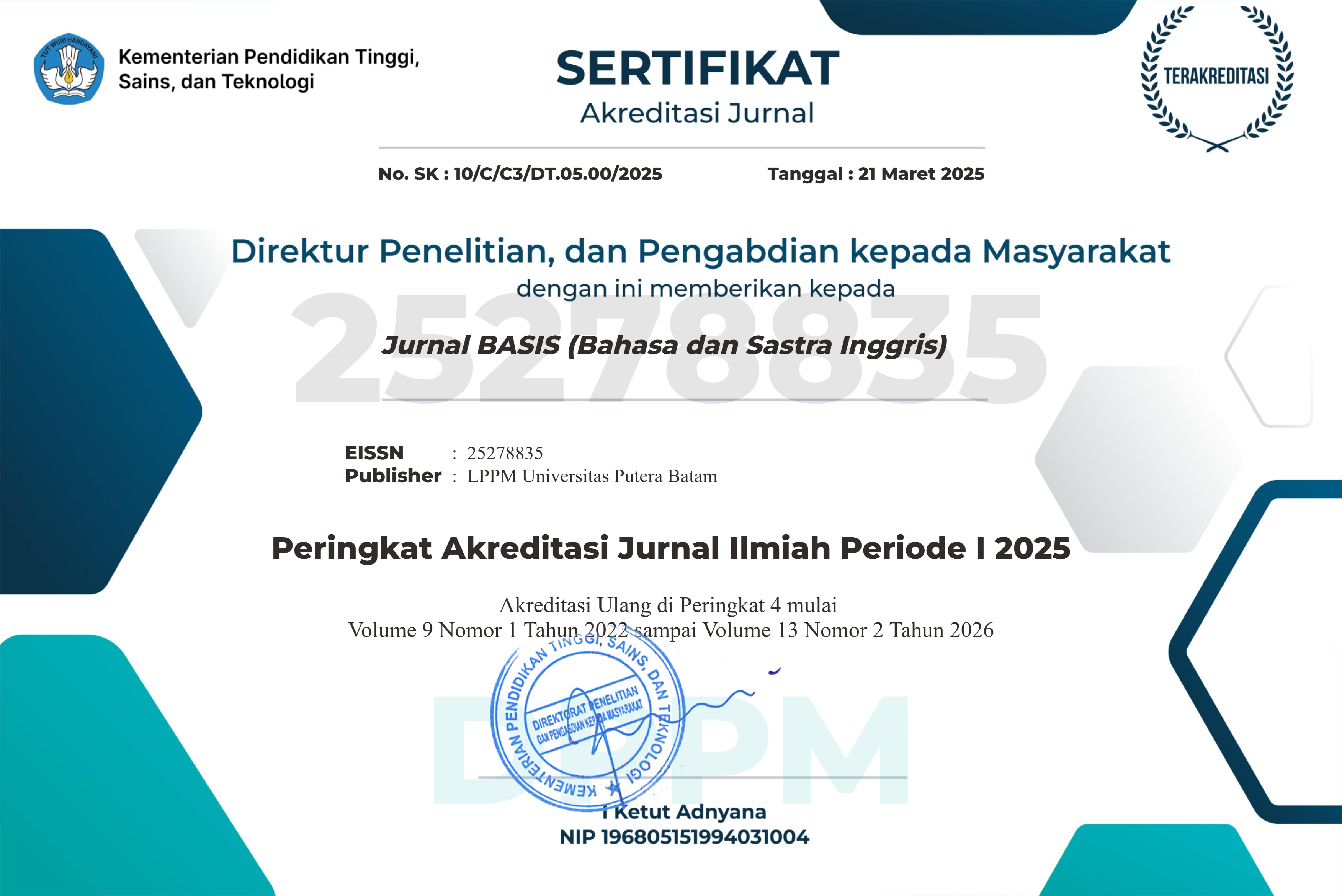POWER AND MADNESS: A FOUCAULDIAN ANALYSIS OF INSTITUTIONAL CONTROL IN SHUTTER ISLAND
DOI:
https://doi.org/10.33884/basisupb.v12i1.9805Keywords:
Institutional Control, Sanity and Insanity, Madness and Civilization, Psychiatric Institution, Mental Health EthicsAbstract
This study examines Michel Foucault's theories on power and madness through the film Shutter Island, focusing on how institutional control shapes perceptions of sanity and insanity. Using Madness and Civilization as a theoretical framework, the research explores how psychiatric institutions define and regulate madness, creating "docile bodies" through surveillance and discipline. The data source consists of selected scenes from Shutter Island that illustrate institutional control mechanisms. The study employs qualitative methods, including scene analysis and dialogue transcription, to uncover the film's depiction of power dynamics. The findings reveal that the institution on Shutter Island functions as both a physical and psychological prison, using isolation, sedation, and psychological manipulation to maintain authority over patients. The narrative critiques the normalization and pathologization of madness, demonstrating how compliance with institutional norms is rewarded while deviation is punished. Authority figures, particularly doctors, play a central role in shaping patients' realities, exposing the oppressive nature of psychiatric institutions disguised as therapeutic environments. This study offers a contemporary application of Foucault’s theories, highlighting the ethical implications of power in mental health care.
References
Beheshti, R. (2009). Foucauldian Docile Body in Dennis Lehane’s Shutter Island. Theory and Practice in Language Studies, 6(10), 2052-2059. http://dx.doi.org/10.17507/tpls.0610.23
Creswell, J. W. (2014). Research Design: Qualitative, Quantitative, and Mixed Methods Approaches (4th ed.). SAGE Publications.
Fortuna, A., & Rahayu, E. (2023). Defense Mechanism on The Main Character of Shutter Island (2010) as Psychoanalysis Study. Dinamika Bahasa dan Budaya: Jurnal pengembangan ilmu Bahasa dan Budaya, 18(1), https://doi.org/10.35315/bb.v18i1.9307
Foucault, M. (1965). Madness and Civilization: A History of Insanity in the Age of Reason. Pantheon Books.
Foucault, M. (1977). Discipline and Punish: The Birth of the Prison. Pantheon Books.
Foucault, M. (2008). “Panopticism” from “Discipline & Punish: The Birth of the Prison.” Race/Ethnicity: Multidisciplinary Global Contexts, 2(1), 1–12. http://www.jstor.org/stable/25594995
Garland, D. (2014). The Culture of Control: Crime and Social Order in Conteporary Society. University of Chicago Press.
Guedon, J. C. (1977). Michel Foucault: The Knowledge of Power and The Power of Knowledge. Bulletin of the History of Medicine, 51(2), 245-277. https://www.jstor.org/stable/44450412
Jahandidie, S., & Taebi, Z. (2003). The Study of Foucault’s ‘The Composition of Forces’ in Shutter Island. International Journal of English Literature and Social Sciences, 7(4), https://dx.doi.org/10.22161/ijels.74.48
Jones, C., & Porter, R. (1994). Reassessing Foucault: Power, Medicine, and the Body (1st ed.). Psychology Press.
Kallman, M., & Dini, R. (2017). An Analysis of Michel Foucault's Discipline and Punish (1st ed.). Macat Library. https://doi.org/10.4324/9781912282630
Manokha, I. (2018). Surveillance, panopticism, and self-discipline in the digital age. Surveillance and Society, 16(2), 219-237.
Meiri, S., & Raz, O. (2021). Dream and Fantasy in Shutter Island: Trauma, Historical Guilt, and Ethics. The Journal of Holocaust Research, 35(1), 1-19. https://doi.org/10.1080/25785648.2020.1858584
Nirmalawati, W. (2022). Tubuh Perempuan; Studi Feminisme dan Relasi Kuasa. Penerbit Forum.
Paternek, M. A. (1987). Norms and Normalization: Michel Foucault’s Overextended Panoptic Machine. Human Studies, 10(1), 97-121. https://www.jstor.org/stable/20008990
Poorghorban, Y. (2023). On Michel Foucault: Power/Knowledge, Discourse, and Subjectivity. OKARA: Jurnal Bahasa Dan Sastra, 17(2), 318-328. https://doi.org/10.19105/ojbs.v17i2.9749
Roberts, M. (2005). The Production of The Psychiatric Subject: Power, Knowledge and Michel Foucault. Nursing Philosophy, 6(1), 33-42. https://doi.org/10.1111/j.1466-769x.2004.00196.x
Samosir, I. R.N., Hutabarat, L. K. Self-Discovery: Psychoanalysis of the Film Bohemian Rhapsody (2018), Jurnal Basis UPB, 9(2), 133-134. https://doi.org/10.33884/basisupb.v9i2.5495
Turkel, G. (1990). Michel Foucault: Law, Power, and Knowledge. Journal of Law and Society, 17(2), 170-193. Wiley. https://doi.org/10.2307/1410084













 JURNAL BASIS (BAHASA DAN SASTRA INGGRIS)
JURNAL BASIS (BAHASA DAN SASTRA INGGRIS)
